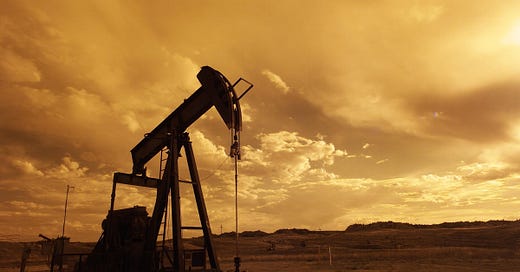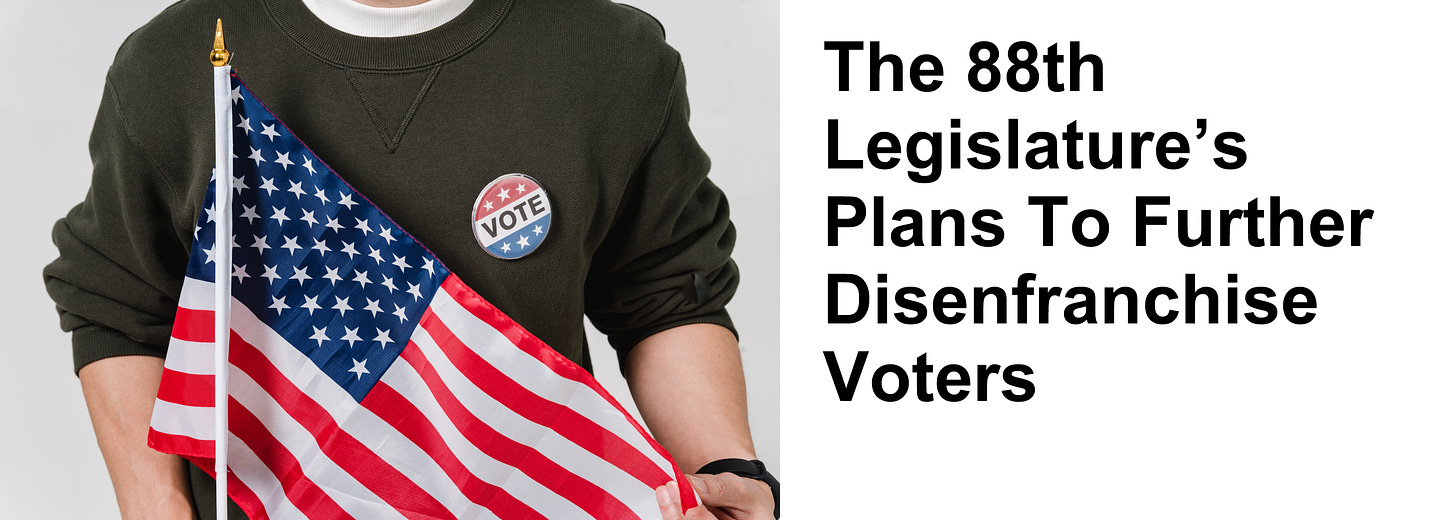Texas GOP Senators Perform Political Theater While Shilling For Oil And Gas
Republican Senators expressed outrage over the free-market approach taken by financial institutions regarding climate action.
(Scroll to the bottom for links to even more LivingBlueTX articles.)
In Texas, oil-money rules the political game. Oil executives spend millions of dollars each election cycle on Republican campaigns. Far-right politicians in Texas generally bend to the will of these cash-cow donors, usually at the expense of the environment and the people affected by pollution or carbon emissions.
Yesterday the Texas Senate Committee on State Affairs held a hearing in Marshall regarding “ESG”—or environmental, social, and governance investing. ESG is this year’s CRT, as Republicans fight in their imaginary culture war against it. The right now calls ESG “woke capitalism,” a head-scratching term to the rest of us.
The hearing yesterday, led by Senator Bryan Hughes, was a circus and demonstrated that Texas Republicans intend to slow climate progress. However, they gave plenty of indications about some of the legislation we might see from Texas’ upper chamber during the upcoming session.
Most alarming was how Republicans embraced climate change denial and prioritized the interests of fossil fuels over the interests of retirees and pension holders.
The senators in attendance were Bryan Hughes, Brian Birdwell, Paul Bettencourt, Eddie Lucio Jr., Lois Kolkhorst, and Bob Hall. Aside from Senator Lucio, a Conservative Democrat that votes in lock-step with Republicans 90% of the time, there were no other Democrats present at this hearing.
The Republican’s star witness.
The star witness of the hearing was billionaire oilman Bud Brigham. If that name sounds familiar, Brigham made a splash last year after attempting to create a Conservative think tank at the University of Texas at Austin focused on promoting individual liberty, free markets, and limited government. The think tank would have been designed as a counterweight to what many conservatives see as a leftward lurch of the intellectual orientation in academia. However, the organization has yet to come to fruition.
During Brigham’s testimony, he made some astonishing claims, including:
Oil and gas can be thanked for a worldwide reduction in poverty. (The U.N. would likely disagree since they’ve been working on reducing global poverty for decades.)
ESG is a sacrifice of shareholders due to virtue signaling.
America has never ratified the Paris Agreement. (President Obama committed to the Paris Agreement, Trump withdrew us from it, and Biden rejoined it as soon as he took office.)
It’s treasonous that financial institutions would force companies they invest with to comply with a foreign treaty that Congress hasn’t ratified.
Capitalism has been fundamental to American exceptionalism.
Capitalism is sustainable for the environment, but ESG is not.
It’s interesting to watch how the Republican Senators interact with Brigham compared to how they act with the representatives from BlackRock. Senator Hughes gave Brigham his undivided attention and grinned from ear to ear throughout Brigham’s entire testimony.
Brigham claimed that a bank told him they wouldn’t lend money to him because Brigham expressed adverse opinions about climate change. But, according to Brigham, a financial institution said to him that if he tweeted the following points, they would lend him money:
Agree that climate change is occurring and that carbon contributes to climate change and global warming. Brigham said, “Of course it is. I don’t believe it’s a climate catastrophe, but that as a statement is true.”
A belief that man is contributing to carbon in the atmosphere. Brigham said, “Yes, of course. Co2 is a greenhouse gas.”
For the other two points, Brigham explained he had a hard time with them because he disagreed.
Agree that the company activities should align with the Paris Agreement. However, Brigham said, “That was not a treaty, it was not ratified, and I don’t think it should be a treaty.”
Believe that companies should commit to achieving net-zero emissions by 2050. But, Brigham said, “That would bring about immense human destruction.”
Brigham’s friend and news sources.
Brigham said he asked a friend of his, a professor at UT Austin, what he thought about this “whole ESG thing.” The friend reportedly told him, “it’s the politicization of commerce.” Senator Kolkhorst later asked him more about his friend, Philosophy Professor Greg Salmieri. While it was never mentioned at the hearing, it should be noted Professor Greg Salmieri is a member of the Ayn Rand Institute.
Bud Brigham also referred to a company in China that engages in slave labor with a higher ESG rating than his company. He learned about this Chinese company from Chuck DeVore's article in the Federalist. Chuck DeVore is an executive at the Texas Public Policy Foundation, an organization recently in the national news for its crusade against climate action. Aside from the fact that the Federalist has long been known to publish false or manipulated information, most of DeVore’s points should be taken with a grain of salt.
Next on the stand was Dalia Blass, Senior Managing Director of the External Affairs Group and BlackRock’s Global Executive Committee member.
During Blass’ opening statement, Senator Hughes is seen playing with his phone, shuffling papers, whispering to his neighbor, and looking around the room. A very different response to the attention he gave Bud Brigham.
As the senators questioned Blass, they repeatedly tried to create “gotcha” moments using BlackRock's statements about climate risk and investor choice on the firm's website. However, at no point did the senators listen to the responses and berated them about how financial firms respond to activists.
See part one of BlackRock’s testimony:
The Republican senators were clearly pushing a political agenda, as Blass repeatedly stated:
Climate risk is material financial risk.
Addressing those risks is a key part of their duty as fiduciaries.
Clients who don’t want to engage in climate risk in proxy voting can buy other policies from proxy advisory firms, take matters into their own hands, and vote themselves.
There is an insidious, coordinated effort among Republican elected officials, conservative dark money groups, and fossil fuel interests that are attempting to block progress to make the financial sector more sustainable. The line of questioning from the Republican senators was performative and embarrassing.
At times the senators appeared to be irate when Blackrock repeated the fossil fuel industry's most common talking point: that oil companies can stay open and get carbon emissions to zero.
See part two of BlackRock’s testimony:
A statement from Rick Levy, President of the Texas AFL-CIO:
“Now I’ve seen everything. Republicans really want to penalize investment firms for doing their job of judging the market and seeking to maximize shareholder value?” said Rick Levy, President of the Texas AFL-CIO. “These games will directly harm working people and especially retirees who depend on investment experts, not oil billionaires or their political errand boys, to make sure their pensions will carry them through retirement, Retired correctional officers, teachers, firefighters, and other public employees benefit from sound investment practices that are not always in line with right-wing ideologues, and when politicians substitute their politics for professional expertise, we all end up paying the price.” From: BlackRock’s Big Problem
The GOP senator’s misplaced priorities will hurt regular people.
Climate change poses a significant financial risk and threatens the entire economy. Texas’ anti-climate movement hurts residents by preventing smart investing in a shrinking pool of financial organizations available to do business with. This is a violation of public officials’ responsibilities to their constituents.
Investors want to know if companies are prepared to capitalize on the transition to a clean energy economy already underway. Global fossil fuel demand has likely peaked, and the vast majority of new energy growth is coming from renewables, accelerated by the Inflation Reduction Act. Big polluters and their far-right political allies can’t stop this transition, so they’re doing whatever they can to slow it down. And they don’t care if people’s retirement savings or taxpayer dollars are sacrificed in the process.
Also testifying was Laurie Heinel, the Global Chief Investment Officer for State Street Global Advisors, the investment arm of State Street Corporation. They manage over $12 billion in Texas pensions.
If the Texas government winds up boycotting State Street, thousands of pension holders would be harmed in the process. Based on the line of questioning, it appears that Senate Republicans plan on doing just that and using SB13 (passed in the 87th legislature). This law prohibits the Texas government from contracting with any company that boycotts oil and will impact the Retired Teachers Pension Fund.
See Senator Lois Kolkhorst’s performative line of questioning:
The GOP Senators concluded that Blackrock and State Street do not comply with SB13. However, beneath the theater of Texas' BlackRock grilling is a basic truth the senators struggle with: Climate risk is an established concept in financial markets, both as a phenomenon and regulatory target, that any responsible fiduciary factors in, regardless of political parties' preferences.
We should expect to see bills coming from the senate soon directly targeting BlackRock and State Street, which will couple with the House bill introduced by Representative Cody Harris to ban companies in Texas from using ESG ratings.
See Senator Paul Bettencourt’s performative line of questioning:
This is an unmistakable political theater of fossil fuel interests.
In a perfect world, these Republicans would take their heads out of the sand to understand that the global market is moving to a low-carbon economy. THAT is the free market. However, when the free market doesn’t represent the personal interests of the corrupt GOP, we wind up with a kangaroo court like we saw yesterday in Marshall.
Even though managing ESG risks is in the best interests of BlackRock’s and State Street’s clients, the Texas GOP will punish them because it directly impacts the oil and gas companies causing cancer clusters all throughout Texas.
And Texas Republicans will push an untrue narrative about “woke capitalism” because it will further their political agenda. Like with everything else the Republicans do, it will be the people of Texas who suffer the most.






